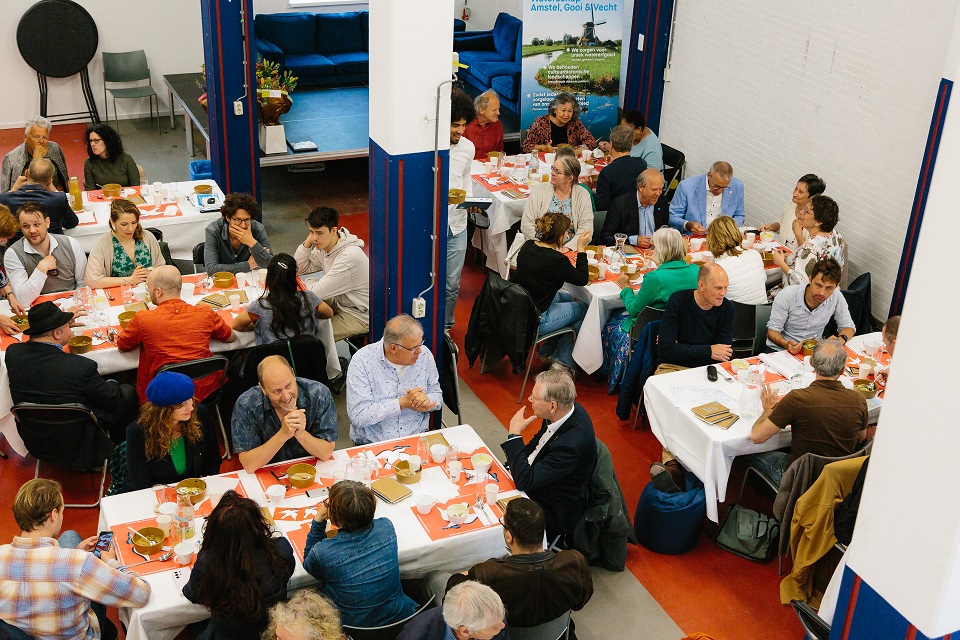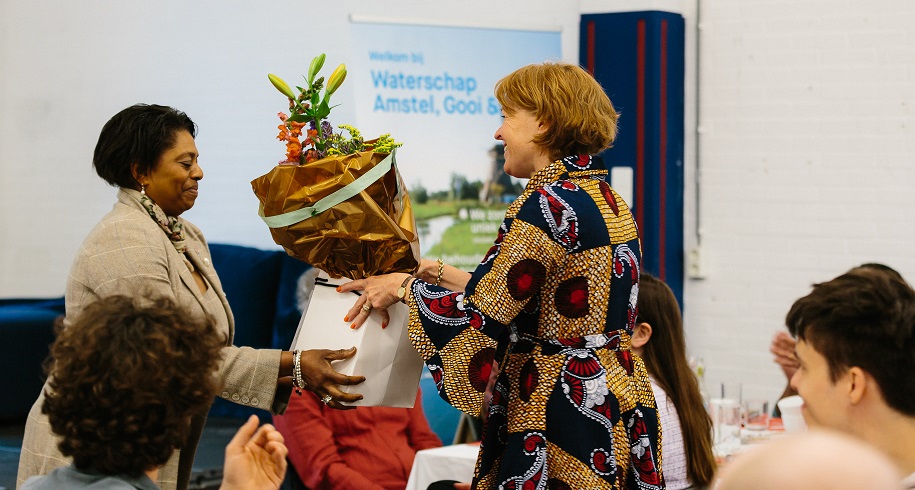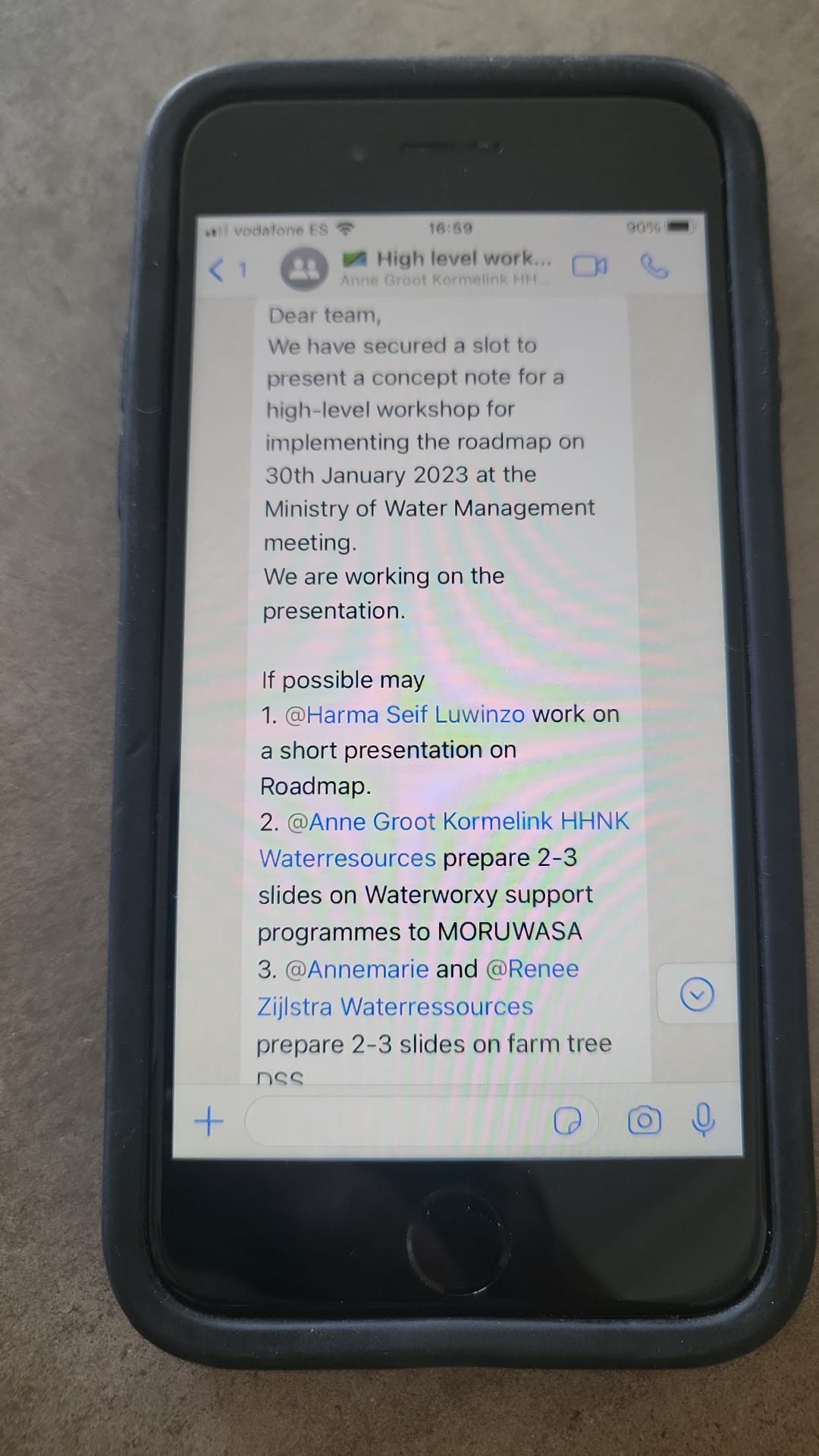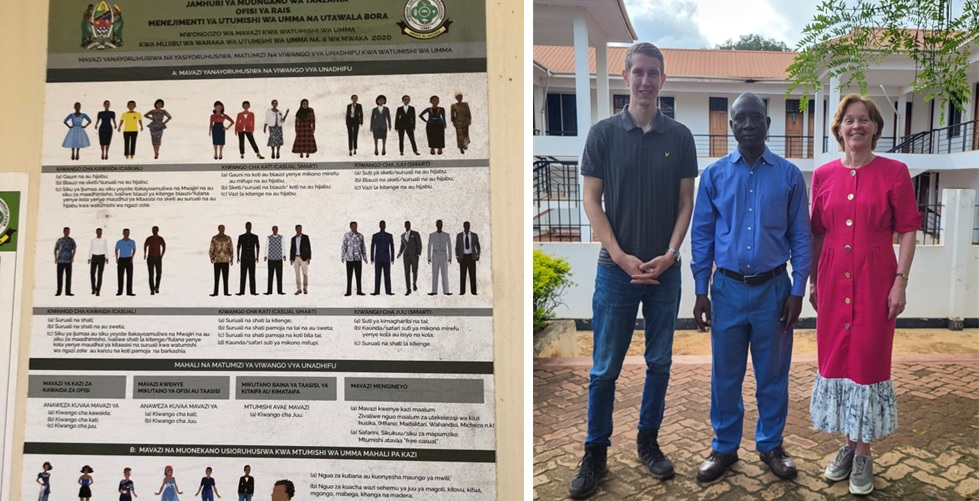Annemarie@Morogoro #2
“No short skirts or holes in pants allowed”Annemarie Weijenberg is project manager of the World Waternet project in Morogoro. In her first blog, she shares her experiences in Tanzania.
Freedom is having access to water
On 5 May, we celebrate our freedom in the Netherlands. Waternet organises a ‘Freedom Lunch’ every year, for everyone to join. This year the theme was 'Water'. I was one of the speakers invited to talk about water, based on my experience at World Waternet in Morogoro, Tanzania. In this project we have a peer-to-peer partnership with MORUWASA, the drinking water and wastewater company of Morogoro.
The question I got was: “How is your project connected to water & freedom?”. I think that freedom also includes free access to water. In the Netherlands, during a period of drought, water will still come out of the tap. But that is certainly not the case everywhere. Last year, Morogoro faced a period of severe drought. Not a drop of water came out of the tap for two weeks. The available water was rationed and divided into time blocks per area.

I shared this experience and our project activities, which contribute to the goal of indefinite access to water, during the Freedom Lunch. It was a very interesting afternoon, everyone could ask questions, enter into discussions and I could explain what we are doing with Waternet experts and various other Dutch partners within this project. Afterwards I received flowers from the dijkgraaf and compliments for my story and the Tanzanian dress that I had put on especially for the occasion.
Various members of the General Board of the regional water authority Amstel, Gooi and Vecht were present during lunch. They were very interested in what World Waternet does and had many questions. It is important that our board members know what World Waternet does, after all they also review the budget and want to know how Waternet deploys its expertise internationally and if funding is being spent wisely.

Last-minute meeting with the Ministry of Water
Also in Tanzania, the administrators are keen to know which activities we are developing. It is very important to include the Ministry of Water in our plans. After all, if extra funding is needed, the Ministry of Water is the institute that can make this available to MORUWASA.
The unlimited dedication of the Tanzanians to their work became apparent last January. Sitting on the couch on a Saturday evening, I checked my Whatsapp messages to see if I had missed anything. And I certainly had. MORUWASA was able to arrange a last-minute meeting with the Ministry of Water. However, this was early on Monday morning, so they asked us if we could deliver our contribution the next day, SUNDAY. Everyone was given the task to deliver PowerPoint slides before 3pm Tanzanian time (1 pm Dutch time). Evidently, our collaboration also continues online and people rely on our water knowledge and expertise.

My colleague and I did discuss whether we were going to make the deadline, after all it was the weekend! After consultation, we worked hard that Sunday to deliver our contribution on time, albeit at 2 pm Dutch time, so that MORUWASA could provide a well-rprepared presentation to the Ministry of Water the next day. And we were not the only ones, colleagues at MORUWASA, the doctors of the university and the employees of Wami Ruvu (the water board) also contributed that Sunday. A real team effort!
No short skirts or holes in your pants
For the Freedom Lunch I had specially put on a dress from Tanzania. During my working visits to Tanzania, I think it is important to respect their dress code. And of course it is also nice to wear the colourful African fabrics. Over the years, I have had a few skirts with matching blouses made there. This way, the local tailor earns money and I support the local economy. Recently I received a very nice compliment from an employee of MORUWASA that really touched me. He said “you always blend in, also with your clothes, you could be one of us!”
In the Netherlands I always think carefully about what I wear. Is it formal enough? Is it suitable for office? Do I want long or short? In Tanzania, too, they have dress codes and they are simply posted on a notice board in the office next to the room of the Director of MORUWASA. They have dress codes for a ‘regular’ day at the office and also for special occasions. They are very clear: no short skirts, no pants with holes in them. And this also applies to men: shorts to work are really not allowed. I recently had a nice dress and it had become a bit too short after washing, so the solution was to add a piece to it and it had the right length again, even when sitting down. The photo below illustrates that.

Agroforestry for protecting water resources
The goal of our project is to provide more people access to drinking water in 2023. To achieve this, it is very important that we share our Dutch knowledge and expertise and enter into partnerships.
In addition to our primary partner MORUWASA, we also collaborate with the Agricultural University of Morogoro SUA (Sokoine University of Agriculture) and the Water Board in Morogoro (WamiRuvu). We work with them to protect the most important water source: the Mindu Dam. This falls under Water Resource Management, abbreviated: WRM. We have drawn up an action plan for this and are we are assessing what we can do in practice. Everything in small steps, of course.
For example, we counteract erosion and sedimentation by planting trees. This method is called Agroforesty. We also look at how we can support the farmers and communities around the rivers, because they too realize that something must be done, otherwise there will be no water in the future. Moreover, their income can be guaranteed by Agroforestry. We are cooperate with, among others, municipalities, political parties, Kinara for Youth Evolution and with the Ministry of Defence, which owns a lot of land around the Mindu Dam.
In Tanzania, taking care of water in the household is the task of the women and girls. They are responsible for ensuring that there is sufficient water. And if it's not there, they have to retrieve it. This means that in tackling the scarcity of water, it is important that we involve women through awareness training about the importance of paying for water and the economical use of water and water resources.
For example, last summer we organised a campaign together with Kinara for Youth Evolution (youth development community) titled: “Don’t be shy, get a bucket”. To show that boys/men can also go and fetch a jerry can of water together with their sisters. If they help their sisters, it goes much faster and their sisters also have more time to do homework or do something else, just like the boys.
To bring the importance of WRM to the attention of women, MORUWASA came up with a fun campaign to celebrate Mother's Day this year. They invited the women from the various organisations with which we work together in Morogoro. These are the women who work at Wami/Ruvu (water board), Morogoro Municipality (municipality), Mzinga (Ministry of Defense), Tanesco (electricity company) and Kinara for Youth Evolution. Together with these women they planted 3000 small trees around the Mindu Dam. This will involve more women in planting trees to protect their water resources. Moreover, they also pass on this knowledge to their children and the environment.
Learning from each other
Back to the Netherlands. During the Freedom Lunch I explained about the training of our plumbers in Tanzania and how we learn so much from MORUWASA too. Somebody asked what do we learn from Tanzania. I think the correct answer is: everything mentioned above!